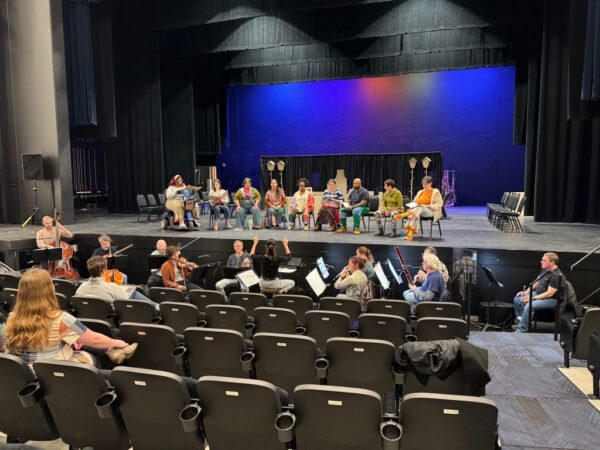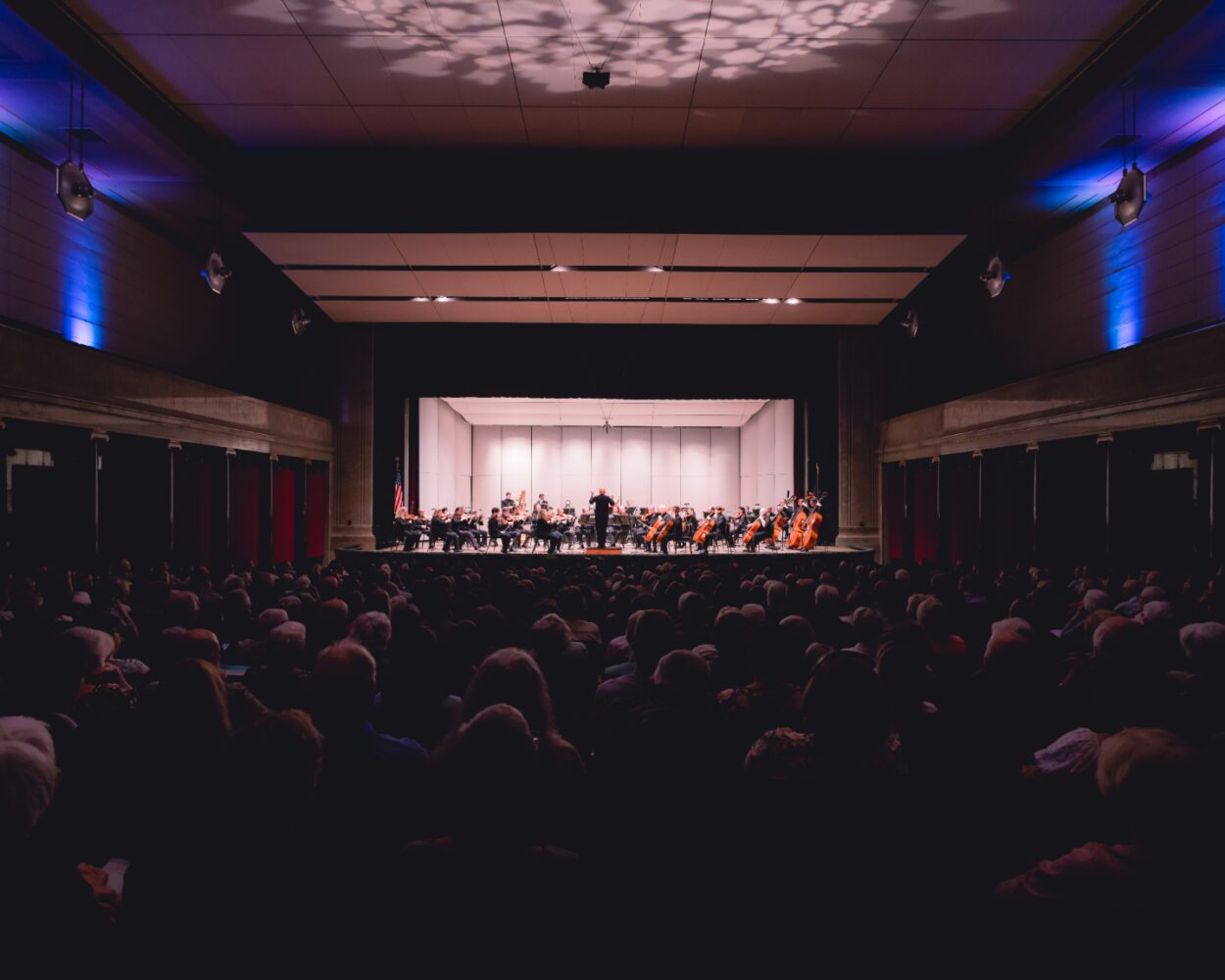
How music and art therapy shaped this original Omaha play
February 12, 2026
Principal Bass Nate Olson's music accompanied art therapy sessions which informed the writing of "Ways to Win the Woods."Tuesday, November 18
Omaha Symphony Artistic Partner Ankush Kumar Bahl returns to Omaha this weekend to conduct Piazzolla & Schumann, a vibrant celebration of music from all over the world.

We talked to Maestro Ankush Kumar Bahl about our Symphony Joslyn concert on Sunday, November 23, featuring Reena Esmail's Testament, Piazzolla's Four Seasons of Buenos Aires, and Schumann's Symphony No. 4. Here is our transcribed conversation with Maestro - enjoy!
Let's start by talking about the music on the program, how everything came together, and how the pieces flow together.
Ankush Kumar Bahl: You know, it's not always the case where all of the repertoire is connected or tells a story through all three pieces. But I can tell you that I love all these pieces dearly. I've been wanting to do the Esmail for years now in Omaha. I've done it about three or four times in other places. I just never really found the right program to do it, but this is a great kind of cornucopia of different kinds of sounds and music, and it just felt like a nice place to put it, especially in my last season. It's very flavorful in terms of the Indian culture and Indian sound world. Reena Esmail is a living female composer of Indian descent, who really tries to tell a story of a real person named Meera Bai who lived in India in the 15th century. She was a poet, and she wrote religious songs and religious poetry to honor Krishna. She was obviously married to a human; she was married to a prince. She was an important person politically as she brought two kingdoms together. But she always actually felt that she was married to Krishna, an Indian god. She was kind of ostracized, slightly persecuted by her in-laws for that belief. And in this story that Reena depicts, we don't know how true it is, but it is a version of what may have happened. There are different stories on how Mirabai died or left this planet. The one we're telling in Testament from Vishwas is that she performs a hunger strike to show her devotion to Krishna outside a temple that's been closed. She just stays out there for days, not eating, and just praying to Krishna. She eventually falls asleep and is awoken by a great storm that causes the swinging lanterns to begin to burn the temple and in the fire the doors pop open and she walks in never to be seen again.
A lot of the piece is based on Indian song and the way Indians sing songs - especially back then, in ragas and whatnot. So, it taps into the Indian sound world, and it is a beautiful story. It's a quick five, six minutes where the orchestra imitates the Indian singing style and you hear the storm brewing and fire swirling. It has a lot of energy and it's a great opener for an audience.
And then the Piazzolla. This is not a work of his I've done before, but we try to use the Joslyn series to really highlight the great musicians of the Omaha Symphony as soloists. And Henry Jenkins, our assistant concertmaster, brought this piece to us as the piece he wanted to do. It just matched the international part of this Joslyn concert with a different flavor, and so it works really well. It's a piece of four movements by an Argentinian composer named Piazzolla, and it describes the four seasons, summer, winter, spring, fall. They can be individual, or they can be put together in a suite. We're doing all four. It's kind of an homage to the great Italian composer, Antonio Vivaldi. He wrote the Four Seasons, which are very, very famous. And if you don't know them, you've heard them in commercials and whatnot. Those pieces were ahead of their time and even sound like rock music sometimes! But the Piazzolla is based on four Argentinian tangos. And really, it's a lovely work. It’s virtuosic, with many cadenzas where we feature Henry, our violinist and soloist. It has a lot of different colors and flavors, but it's all based on dance and tango. It's a super fun piece. It's going to show Henry off, and it's going to be a crowd pleaser as well.
Finally, the Schumann is a piece I've loved for decades. Schumann's a German composer. I think there's like three or four composers that are well-known that really bridged the gap from the classical music from the classical period, like Mozart and Haydn, into the romantic periods, like Brahms and later Rachmaninoff and all these other romantic, really heartfelt composers. There's a couple that are in-between that are kind of misunderstood, like Schubert, Mendelssohn, and Schumann. I think some people think of them as more Mozartian, and I think of them as really more Brahmsian. Because of that, I feel like Schumann's 4th Symphony is kind of that last bridge until we get to Brahms and get really romantic. I think they're almost overlooked because they're that bridge.
I've championed Schumann, Schubert, Mendelssohn my entire career because of my mentorship with Kurt Masur, the really wonderful German conductor that I worked with toward the end of his life. And these pieces are very special to me. I think they're completely epic. They're beautiful, they're dark, they're a movie soundtrack, they're emotional - they have everything. The four movements really encapsulate the world, the darkest of dark and the happiest of happiness. They're just really wonderful pieces to explore, especially with a group like the Omaha Symphony. I just can't wait to get my fingers into this piece with them. Schumann only wrote four symphonies, like Brahms only wrote four symphonies. He wrote a lot of other pieces, but these symphonies are four opportunities to really see his ability to write for a full orchestra.
Something I think is interesting is that Schumann was a mentor of Brahms. Clara Schumann, Schumann's wife, was about 14 years older than Brahms, and Schumann was a little bit older than that. They really recognized Brahms as a younger composer of extreme talent. At some point, Brahms actually lived with them and was working with them. Brahms edited some of Schumann's works and Clara edited the symphony that we're performing on Sunday.
She was a great pianist and a great composer as well. Some of his pieces are attributed to her. They just thought they would publish under his name because he was a man and she was a woman. It would just make it easier back then.
When Schumann was dying and kind of losing his mind, Brahms was there to support Clara. There are some rumors of him having a relationship, and most people think it was platonic, because of the age difference and the respect for Schumann. But there's rumors that that wasn't the case as well, and it's all kind of connected. But they certainly learned from each other musically, and Schumann very much respected Brahms (and vice versa). Brahms took what Schumann was doing and moved it forward to become what we know as Brahms, who is really one of my favorite composers. So that connection is always really kind of fun to think about as well.
Is there one piece that you're most excited to perform out of those three?
I'm excited to share the Esmail with everyone. I think she is an important living composer. I'm excited for Henry's debut as a Symphony Joslyn soloist. I hired Henry - that's kind of a fun part of the Music Director job. He's one of the dozen people that we identified in our national blind auditions who won a position with the Omaha Symphony which obviously changed their life, changed our lives, and changed the orchestra. That's something I'm really proud of as a music director; to have brought in so many really great musicians and change the sound of the orchestra. That is incredibly rewarding.
The Schumann is something that I'm extremely excited to work on. It’s a piece I really want to get into and get deep with the orchestra. That's where the really, really great work can happen. I don't know the last time the orchestra played it, but again, it's not a super often-played piece. So, it's probably been at least a decade or two.

What do you like most about performing at Witherspoon Hall in the Joslyn?
I mean, what a beautiful space, and what a wonderful testament and tribute to all things possible in Omaha. To have a concert hall there and be able to perform there, kind of in the heart of all this art, is really special. Everyone likes going to rehearsals there. Everyone likes walking around the museum after rehearsals and after performances. It has that beautiful cafe with the glass and the sculptures. Why wouldn't you want to make music there? Hopefully it's a beautiful sunny Sunday, where you can explore the museum before and after, get some food, walk around with your kids, and then come in for a concert. I mean, the space is so beautiful and awesome. When I first started as music director, we did this thing called Maestro Mixtape where we had four different conductors in four different wings of the museum, conducting and playing four different pieces at the same time.
You could take your drink and go to the next room and hear another piece and then walk to another area and walk in and out of the performance similar to how people consume the art. We had a new contemporary living composer in the contemporary wing; we had a baroque piece in the baroque wing, etc. Then, everyone joined in the concert hall for a final full orchestra performance of American music.
It speaks to the space. When I first saw it, I was like, "Okay, this is what we have to do. We have to use the space and live with this art." So, making music around that art has always been a passion and a priority of mine.
What are you looking forward to the most about coming back to Omaha or performing this concert?
The people. I am a people person. I'm looking forward to seeing my friends in Omaha, my friends in the orchestra, and the staff and administration. I miss everyone's face, and I miss everyone's voice. It's been a couple months, and again, it's been a really great summer and fall making music at other places and also being with the family. But to come back and work with people you know so well is very exciting. And of course, because of The Joslyn, seeing that museum again, I've only experienced the new wing a couple of times, so it'll be fun to go back to. I'm going to go through my old haunts in downtown Omaha and see the friends I want to see and eat the foods I like to eat and hopefully have good weather. All the things! Omaha has always been a special place for me. When I first came in 2019, I really enjoyed it, and it's great to be able to return!
Love the Omaha Symphony?
Be the first to learn about new concerts, stories, and special offers.